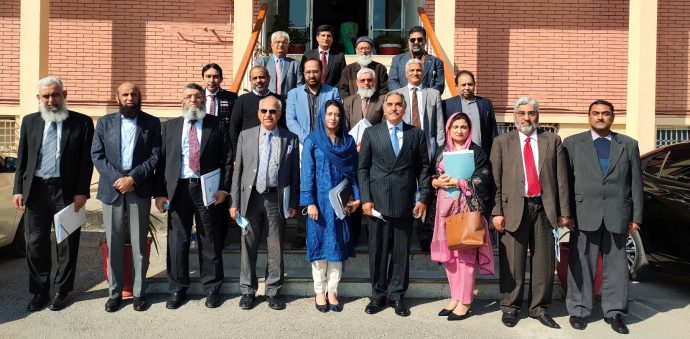
Many universities have not been able to launch a BS programme
The largest barriers to the BS four-year curriculum, according to vice chancellors of government universities in several Sindhi cities, including Karachi, are the institutions’ lack of infrastructure, semester system, and topic teacher shortage.
In order for government colleges to maintain their affiliation for the four-year curriculum, the Department of College Education Sindh has requested that institutions furnish the necessary foundational resources prior to initiating the four-year BS programme. In this regard, the topic of linking a four-year BS degree programme to government colleges in Sindh, including Karachi, was discussed at a significant meeting that took place on Tuesday at Sindh HEC.
The conference was chaired by Dr. Tariq Rafi, the chairman of the Sindh HEC. Attending the meeting were affiliation secretaries of the universities, secretary universities and board Noor Samu, secretary college education Sadaf Sheikh, secretary Sindh HEC Moinuddin, vice chancellors of other general government universities in the province, and Dr. Amjad Siraj Memon, permanent vice-chancellor of Jinnah Sindh Medical University and acting vice-chancellor of Lyari University, vice-chancellor of the University of Karachi Prof. Dr. Khalid Mehmood Iraqi, Dr. Jalbani, vice-Chancellor of Sindh University Jamshoro, vice-Chancellor of Sindh University Jamshoro, Dr. Siddiq Kalhoro, as well as vice chancellors of the province.
The sources state that in response to the secretary college education proposal, it was determined that, given the current circumstances, a four-year BS degree programme ought to be launched in at least one government college located in each of Sindh’s districts, including Karachi. In order to commence degree programmes in these colleges for the upcoming academic year 2025, these colleges should be selected based on which ones are superior in terms of facilities and more suitable with the affiliation policy of HEC and universities.
According to a department of college education officer, government institutions currently provide two-year associate programmes following graduation. However, the number of students enrolled in these programmes is steadily declining, with just a small number of students registered at this time.
The primary cause of this predicament was identified by a vice chancellor, who stated, “We began this curriculum as conventional education, but associate degrees are copied from other nations where the programme is performed as technical or vocational education. The pupils are not receiving their diplomas from us. In the same way, this programme uses an annual examination system rather than a semester one.
“Enrollment in the colleges which have been given the affiliation for BS four year programme is so low that running the programme is difficult,” stated a vice chancellor who was also present at the meeting.
It was brought to the meeting’s attention that college subjects are severely lacking in teachers. If a teacher is hired to begin the intended plan, he or she is transferred after only a few months, which makes it impossible to administer the programme and has a negative impact on the students’ performance. A vice chancellor underlined that since a four-year degree necessitates it, colleges offering BS degrees must use the semester system.
But because they are used to the yearly exam system, teachers are untrained and unfamiliar with it. The Federal HEC’s new affiliation policy was criticised during the conference as well. The regulation, according to Dr. Amjad Siraj Memon of Lyari University, prohibits de-affiliated colleges from re-affiliating even if they fulfil the standards. He pointed out that the new approach delayed syndicate meetings for university clearance.
During the discussion, it was decided that Sindh HEC will provide Federal HEC with pertinent information and create a form for universities offering four-year degree programmes. This form will track inspection statuses and affiliation applications, which will then be submitted to the Sindh High Court in accordance with its directive to initiate four-year degree programmes in colleges.

Content writer, educationist, teacher, researcher, social media manager, and a SEO manager from lahore. She has been working as a freelance academic and non-academic writer for more than 10 years now. She has a passion to learn new things and has a knack for writing and she combines both things to produce write ups she pours her heart out in.

